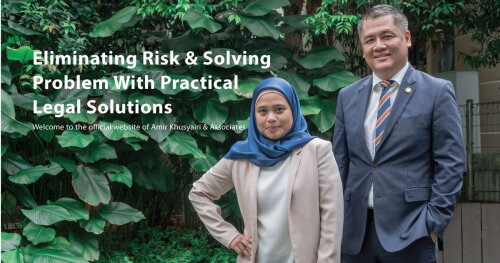Best Tax Increment Financing Lawyers in Shah Alam
Share your needs with us, get contacted by law firms.
Free. Takes 2 min.
List of the best lawyers in Shah Alam, Malaysia
About Tax Increment Financing Law in Shah Alam, Malaysia
Tax Increment Financing (TIF) is a financial mechanism employed by local authorities to promote economic development and redevelopment of urban areas. In Shah Alam, Malaysia, TIF involves using the future incremental property tax revenues generated from an improvement project to finance the cost of the project itself. It is designed to attract developers to invest in areas that require significant improvements by deferring the financial burden onto the increased tax revenue the development will generate. Shah Alam, being a rapidly developing city, sees considerable potential in utilizing TIF to rejuvenate specific urban zones and stimulate economic growth.
Why You May Need a Lawyer
There are several scenarios where you might require legal assistance with TIF in Shah Alam:
- Negotiating Development Agreements: Lawyers can ensure that your interests are protected in development contracts associated with TIF.
- Compliance and Regulations: Navigating the local and national regulatory frameworks surrounding TIF requires legal guidance to ensure compliance.
- Dispute Resolution: If disputes arise between developers, local authorities, or third parties, legal counsel can facilitate resolution.
- Contractual Obligations: Understanding and fulfilling contractual obligations in TIF projects often necessitate legal expertise.
- Tax Implications: Lawyers can provide detailed analyses of tax consequences related to TIF initiatives.
Local Laws Overview
The implementation of Tax Increment Financing in Shah Alam, and more broadly Malaysia, is guided by various local and national legislation including the Local Government Act 1976 and Land Acquisition Act 1960. Key aspects of these regulations include:
- Establishment of TIF Districts: Local authorities have the power to designate specific areas as TIF districts for redevelopment.
- Project Approval: Projects undergoing TIF must get approval from both local and national government bodies.
- Financing Structure: Financing mechanisms are deeply rooted in legislation that provides guidelines on leveraging future tax revenues.
- Public Participation: There are procedures in place to involve public opinion and ensure transparency in TIF projects.
Frequently Asked Questions
1. What is Tax Increment Financing?
Tax Increment Financing is a public financing method used for subsidizing redevelopment, infrastructure, and other community improvement projects through the future gains in taxes.
2. How does TIF work in Shah Alam?
TIF in Shah Alam works by utilizing the anticipated increase in property tax revenue from a redevelopment project to fund the project's initial costs.
3. Who manages TIF projects in Shah Alam?
TIF projects are typically managed by local authorities, in collaboration with developers and other stakeholders, ensuring alignment with wider urban development plans.
4. What types of projects typically use TIF?
TIF is often used for projects aiming to revitalize declining areas, including the development of public infrastructure, commercial buildings, or housing projects.
5. Are there limitations on where TIF can be applied?
Yes, TIF is usually applied in predefined districts that have been designated by the local authority as requiring redevelopment.
6. What are the benefits of using TIF?
TIF helps stimulate private investment, supports community developments, and improves infrastructure without affecting current tax levies.
7. What are the risks associated with TIF?
The primary risks include the speculation of property values not increasing as predicted and potential financial strain on existing municipal services.
8. How long do TIF districts typically last?
TIF districts generally last until the project debt is paid off, which can range from a few years to several decades.
9. Can TIF be used for projects other than infrastructure?
Yes, TIF can fund a variety of projects including housing, commercial developments, and rehabilitation of historic sites.
10. How can TIF impact property taxes for residents?
While TIFs do not directly increase current taxes, they can influence overall community development, potentially affecting property valuations and corresponding taxes over time.
Additional Resources
For more information on TIF, consider contacting the following resources:
- Shah Alam City Council (MBSA): Primary local authority managing urban planning and development.
- Ministry of Housing and Local Government: Oversees national urban development policies.
- Malaysian Investment Development Authority (MIDA): Provides resources on investment opportunities and incentives.
- Local law firms: Many firms offer consultations specifically on property development and TIF-related legalities.
Next Steps
If you are considering utilizing TIF or need legal assistance in Shah Alam, follow these steps:
- Seek preliminary legal advice from a qualified attorney with experience in TIF projects.
- Engage with local authorities to understand the specific requirements and opportunities within Shah Alam.
- Consider consulting with urban development experts who can guide the financial and strategic planning aspects of TIF.
- Prepare all documentation related to your project for review, including plans, budgets, and projections.
- Stay informed about any changes in local or national legislation that may impact TIF initiatives.
Lawzana helps you find the best lawyers and law firms in Shah Alam through a curated and pre-screened list of qualified legal professionals. Our platform offers rankings and detailed profiles of attorneys and law firms, allowing you to compare based on practice areas, including Tax Increment Financing, experience, and client feedback.
Each profile includes a description of the firm's areas of practice, client reviews, team members and partners, year of establishment, spoken languages, office locations, contact information, social media presence, and any published articles or resources. Most firms on our platform speak English and are experienced in both local and international legal matters.
Get a quote from top-rated law firms in Shah Alam, Malaysia — quickly, securely, and without unnecessary hassle.
Disclaimer:
The information provided on this page is for general informational purposes only and does not constitute legal advice. While we strive to ensure the accuracy and relevance of the content, legal information may change over time, and interpretations of the law can vary. You should always consult with a qualified legal professional for advice specific to your situation.
We disclaim all liability for actions taken or not taken based on the content of this page. If you believe any information is incorrect or outdated, please contact us, and we will review and update it where appropriate.












